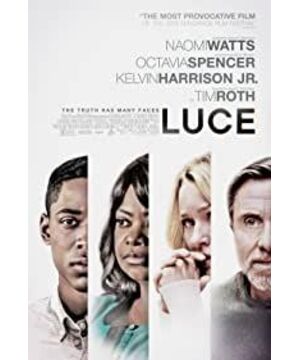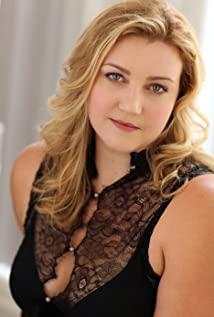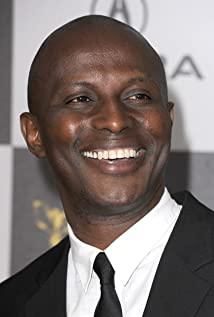Life is a box.
Forrest Gump's box is full of chocolates, and each one has a different flavor.
And Luce's box is his shackle.
At the age of seven, Luce was a child soldier living in Eritrea, a war-torn country in Africa. White middle-class parents Amy and Peter from the United States adopted the child.
Under the protection and care of his parents, schools, and the state, the smart Luce overcame the shadows over the years and became a standard honor student, and at the same time became a kind of "political propaganda label".
The movie "Luce" tells the story of the contradiction and truth behind the evolution of a small friction into a big conflict between Luce, who was about to graduate from high school and entered college at the age of 17, and his African-American teacher Wilson.
Luce's experience was too special.
You can say that he is a child saved by politics, or you can say that he is a child bound and imprisoned by politics.
Americans want Luce to be a model - to prove that the American democratic society can change this child from a war zone, full of holes; the soil and sunshine of the United States can nurture such a child into a towering tree, upright, upright, excellent, and even is perfect.
All kinds of social resources and privileges favored him, he was placed in the spotlight, and everyone looked at him with a "colored magnifying glass".
He had to be perfect, there was no other choice.
His experience determines that any of his actions may be over-interpreted, and it also determines that everyone will eventually protect his "small problems".
But no matter how special the experience is, it can't change the fact that Luce is actually an ordinary person. He doesn't enjoy this kind of exposure, he also suffers from this kind of preferential treatment, and he doesn't want to be labeled.
This is the origin of the conflict between Luce and Mr. Wilson.
Luce's Asian girlfriend, Stephanie, gets drunk at a party and becomes the entertainment of Luce's friends, a group of drunk boys.
Teacher Wilson learned of this situation, encouraged girls to report these children, and rose to the height of "a political movement for women to fight for their own rights".
Stephanie wavered, and Luce, wanting to protect her friend, persuaded Stephanie to keep silent and broke up with her.
Due to Mr. Wilson's constant allusions that Stephanie concealed things, the rumors became more and more, and the conflict between Mr. Luce and Mr. Wilson continued to intensify.
Luce's black friend Deschamps, himself a scholarship player on the school's sports team, lost all opportunity when Mr. Wilson found marijuana in his locker and called the police.
Strictly speaking, Mrs. Wilson did nothing wrong, but based on a politically correct position, she was carrying out what she thought a teacher should do—for fifteen years, she had done her best to the school and students.
But she is not completely fair and objective, unselfish.
For an assignment, Luce chose a politician who advocated violent rebellion against the regime.
Because of Luce's special background, Mr. Wilson panicked at his thoughts, so he searched his locker privately and found a package of illegal fireworks inside.
But Mr. Wilson neither made it public nor chose to call the police, but called Luce's mother Amy.
In the eyes of those American adults, there is no room for smearing in the excellent and typical characters they have created. Whether it is for his personal future or for the political image of the United States.
After Deschamps' marijuana incident, Mr. Wilson called all the black boys on the sports team and asked them to learn from Luce.
In fact, Luce was also involved in smoking marijuana, but Deschamps was the one who got caught.
In the eyes of this group of half-old children, including Deschamps and Luce, they understand but cannot accept this so-called "political correctness" - why Luce is different from others, and why Luce is always the benchmark.
At the age of 17, Luce lost himself like many children.
He burst into tears as he spoke about the origin of his name during a speech rehearsal.
The little boy who raised a gun to protect himself and his companions when he was 7 years old lost his way. He may no longer know who he is, but he also doesn't want to be labelled and defined by anyone. What's more, the pack of fireworks was put in Luce's locker by the school team members in the public locker. But combined with his dissertation and his background, it seems only reasonable for him to have such violent thoughts and behaviors.
So he used his own cleverness to fight against the "political correctness" and "stereotypes" represented by Mr. Wilson. He took every step of the way, designing to make the parents and the principal think that Mr. Wilson had a problem, until he finally put Mr. Wilson. expelled from school.
In front of smart "typical" students, Mr. Wilson also had to become a victim of "political correctness".
Teacher Wilson is also black, female, and has a mentally ill sister.
She used her decades of life to personally experience the existence of that invisible box. In Luce's view, she was the accomplice in guarding the box, or deciding who in the box could see the sunlight.
But Mr. Wilson said that it was children like Luce who decided whether or not they could touch the light.
In fact, there is no absolute freedom in the world, just how big, how high and how bright the box is. But borders are always there, they are laws, they are politics, they are rules.
Rather than saying that Teacher Wilson is an accomplice of political correctness, she understands that no one can resist the boundaries of the box. Everyone can only touch that light with their own efforts within the framed range. And all these perks, conditions, concessions, glitz... It's not easy for black people - you have to be on top to enjoy it all - because of labels, because of stereotypes .
Ruth, who can't make mistakes and can't be stained, actually hopes to fight against this sense of fate deep in his heart. He may eventually follow the same path as Mr. Wilson, accepting the existence of this box, accepting the so-called label, and accepting that there is no choice but to be excellent and not make mistakes.
But 17-year-old Luce just wanted to be a normal person.
At the end of the movie, Luce officially gave a speech in the auditorium, talking about his first encounter with his parents, and the origin and meaning of the name "Luce" - his parents named him Luce, which means light.
He no longer burst into tears.
He was standing outside the box in front of the people watching him, and he put on his mask during the scheduled scene.
Mom Amy has been searching for the truth, while she doesn't believe her son is such a person, and on the other hand, she is afraid that it seems to be the case.
And until the end, she didn't get the full picture of the story - but she chose to keep her mouth shut and become an accomplice.
The truth doesn't matter to her anymore.
Dad Peter loved the family from beginning to end, and he wanted to live like a normal human being, not live his life as a political show.
So he is as reasonable as every ordinary father to doubt whether his son is lying, and in some of the truths he has been told, he chooses to believe his son and stand with his family-although he may not agree with his mother Amy's choice, he eventually He chose family over politics, but he also became an accomplice who knew but concealed the truth.
At the end of the movie, there is no real answer - the problem is unsolvable. Every care must be mixed with discrimination, and every choice must be mixed with prejudice.
Those questions that were turned into the sun were hidden back in the box.
Everything is peaceful again, and everything can only be peaceful.
-END-
Original: Yi Xiaomeng
First published on the public account: a little movie
View more about Luce reviews











